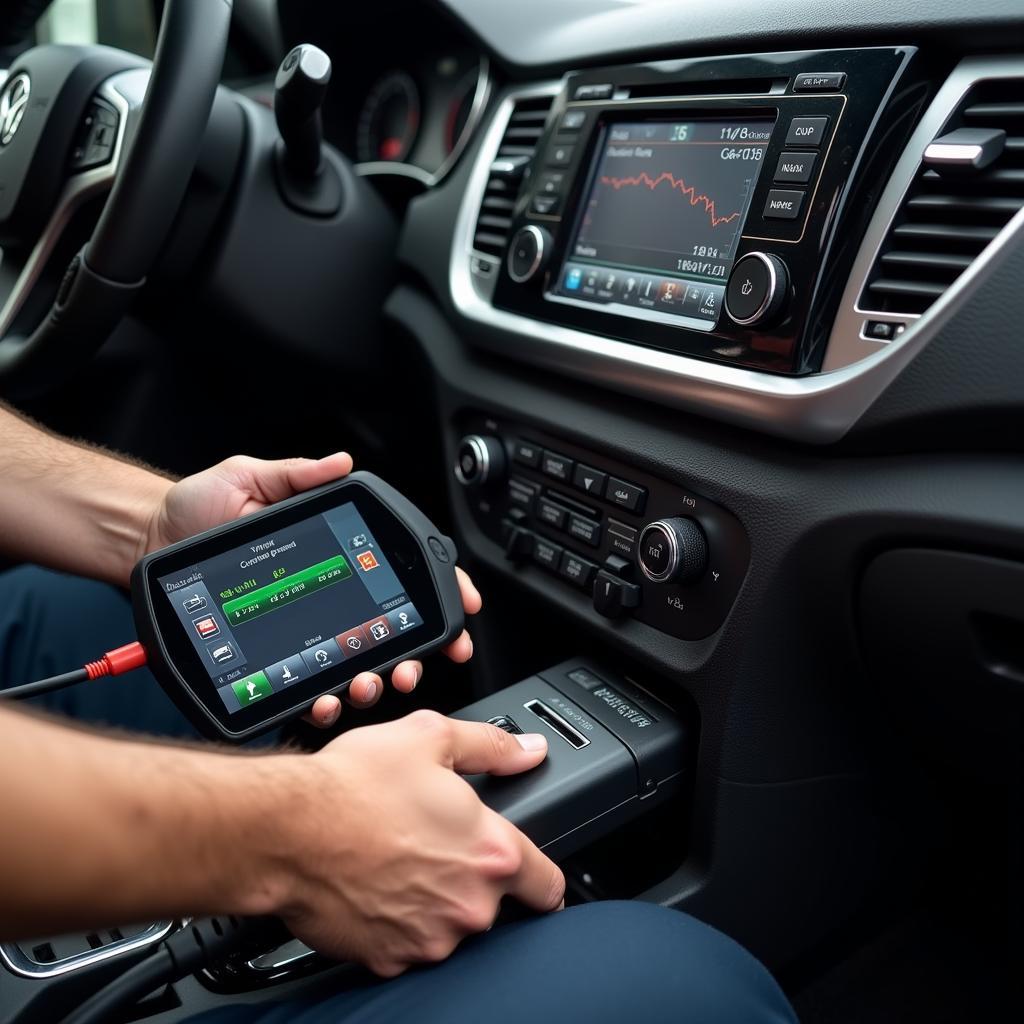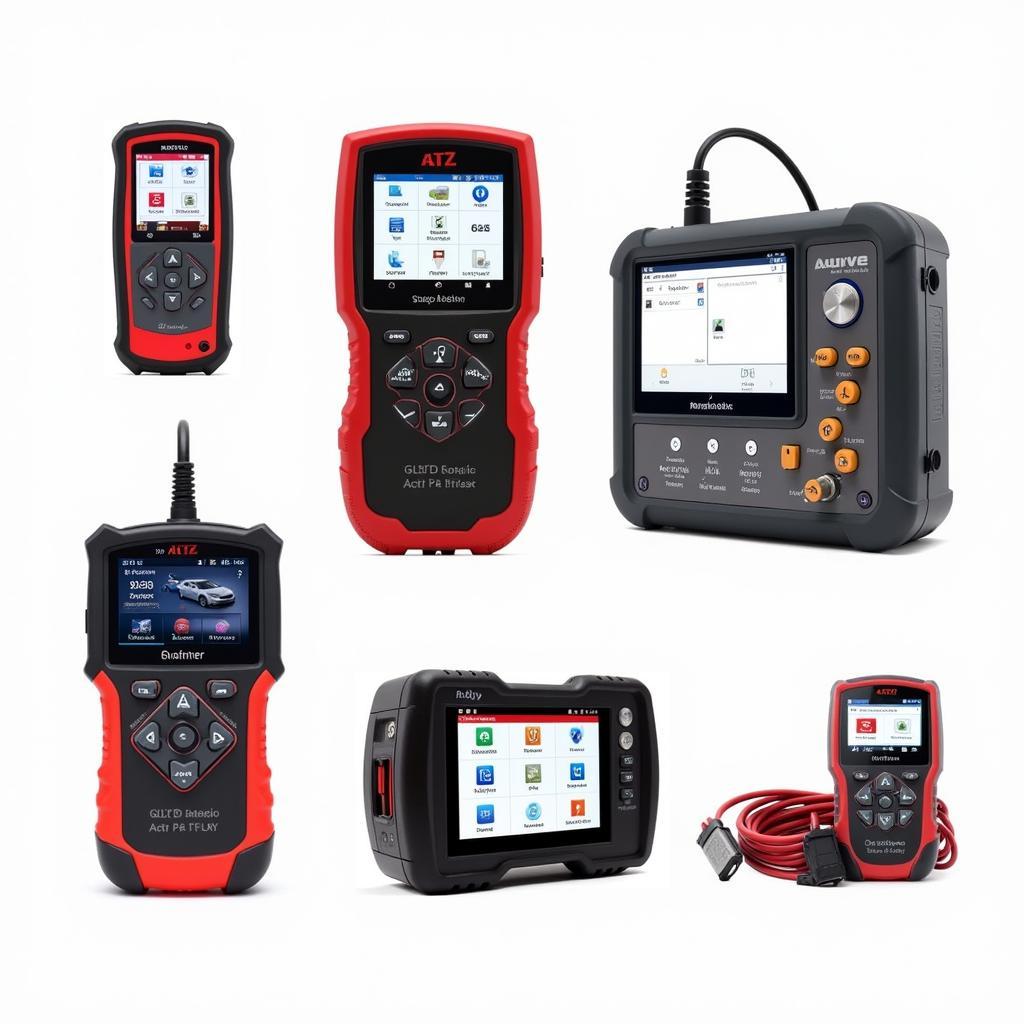In today’s technologically advanced automotive landscape, Car Fault Diagnostics Machines have become indispensable tools for mechanics and car enthusiasts alike. These sophisticated devices, often referred to as OBD2 scanners, provide a window into the intricate workings of modern vehicles, allowing users to identify and diagnose faults with remarkable accuracy.
 Mechanic using a car fault diagnostics machine to troubleshoot engine problems
Mechanic using a car fault diagnostics machine to troubleshoot engine problems
Understanding the Role of Car Fault Diagnostics Machines
Car fault diagnostics machines work by communicating with a vehicle’s onboard computer, also known as the Engine Control Unit (ECU). The ECU continuously monitors various sensors and systems throughout the car, storing diagnostic trouble codes (DTCs) when malfunctions occur. By connecting a diagnostics machine to the vehicle’s OBD2 port, mechanics and car owners can access these DTCs, gaining valuable insights into the nature and location of the problem.
Types of Car Fault Diagnostics Machines
The market offers a wide range of car fault diagnostics machines, each tailored to different needs and budgets. Entry-level code readers provide basic functionality, allowing users to read and clear DTCs. In contrast, professional-grade scan tools offer advanced features such as live data streaming, actuator tests, and ECU programming capabilities. car-diagnostics
 Various car fault diagnostics machines, from basic code readers to professional-grade scan tools
Various car fault diagnostics machines, from basic code readers to professional-grade scan tools
Benefits of Using Car Fault Diagnostics Machines
Investing in a car fault diagnostics machine offers numerous advantages, including:
- Accurate Diagnostics: Pinpoint the root cause of car problems with precision, eliminating guesswork and unnecessary repairs.
- Cost Savings: Identify issues early on, potentially preventing costly repairs down the line.
- Time Efficiency: Quickly diagnose faults, reducing the time spent troubleshooting.
- Enhanced Vehicle Performance: Ensure optimal vehicle performance by monitoring and addressing potential issues promptly.
- Increased Knowledge: Gain a deeper understanding of your vehicle’s systems and their operation.
Choosing the Right Car Fault Diagnostics Machine
Selecting the appropriate car fault diagnostics machine depends on individual requirements and budget constraints. Factors to consider include:
- Vehicle Compatibility: Ensure the machine is compatible with the make, model, and year of your vehicle.
- Functionality: Determine the desired features, such as code reading, live data, and special functions.
- User Interface: Choose a machine with an intuitive and user-friendly interface.
- Software Updates: Opt for a model that offers regular software updates to stay current with the latest vehicle technologies.
The Future of Car Fault Diagnostics
As vehicles become increasingly complex and interconnected, car fault diagnostics machines continue to evolve. The integration of artificial intelligence (AI) and machine learning is poised to revolutionize the field, enabling predictive diagnostics and proactive maintenance.
Conclusion
Car fault diagnostics machines have become essential tools in the automotive industry, empowering mechanics and car owners to diagnose and resolve vehicle issues with accuracy and efficiency. By understanding the capabilities and benefits of these devices, individuals can make informed decisions when choosing the right machine for their needs, ensuring optimal vehicle performance and longevity.
FAQs
1. Are car fault diagnostics machines difficult to use?
Many car fault diagnostics machines are designed with user-friendliness in mind. However, some professional-grade tools may require a certain level of technical expertise.
2. Can I use a car fault diagnostics machine on any vehicle?
Vehicle compatibility varies depending on the make, model, and year. It’s crucial to choose a machine that supports your specific vehicle.
3. How often should I use a car fault diagnostics machine?
While there’s no set schedule, it’s generally a good practice to perform a diagnostic scan whenever you experience vehicle trouble or as part of regular maintenance.
4. Can a car fault diagnostics machine clear warning lights on the dashboard?
Yes, most car fault diagnostics machines allow you to clear DTCs and reset warning lights, but it’s crucial to address the underlying issue first.
5. Do I need a professional mechanic to use a car fault diagnostics machine?
While basic code readers are user-friendly, interpreting complex data and performing advanced functions may require professional expertise.
6. Can car fault diagnostics machines diagnose problems with the car’s electrical system?
Yes, car fault diagnostics machines can often diagnose problems with a vehicle’s electrical system, including issues with the battery, alternator, and wiring.
7. Can car fault diagnostics machines program new keys?
Some advanced car fault diagnostics machines offer key programming capabilities, but this functionality is often limited to professional-grade tools.
Need further assistance? Contact us via WhatsApp: +1(641)206-8880 or Email: [email protected]. Our dedicated support team is available 24/7 to assist you with any questions or concerns.

Leave a Reply